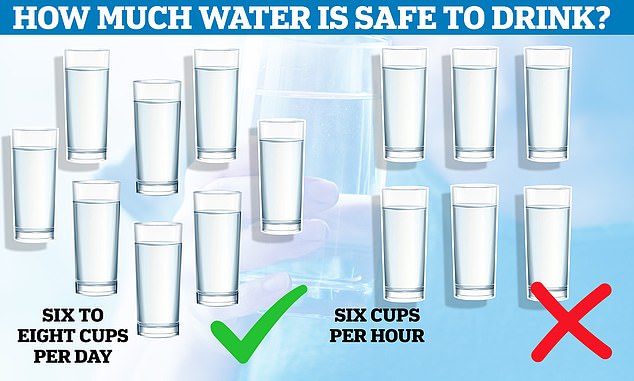Texas man hospitalized after WATER intoxication after drinking 3 gallons too fast, causing health crisis
A man in Texas experienced heart attack-like symptoms after drinking too much water.
John Putnam, 74, was working as a gardener in June when temperatures rose to 100.4 degrees Fahrenheit.
By the time Mr. Putnam had mowed his second lawn that day, he was so thirsty that he had drunk nearly three gallons of water in five hours.
However, he was overwhelmed by nausea and fatigue, which translated into chest pain and difficulty breathing by the evening.
Mr. Putnam was rushed to the hospital thinking he had suffered a heart attack. Instead, he had suffered water intoxication, which is caused by having too much water in the body and not enough sodium.
John Putnam, 74, suffered water intoxication after drinking three liters of water in five hours

Ashley Summers, 35, was a daycare worker and mother of two. She died shortly after the Fourth of July holiday last year from water intoxication, or hyponatremia
“I didn’t even know such a phenomenon existed,” Putnam told the Wall Street Journal“I actually drank the water down, thinking I needed it.”
The incident occurred about a year after Ashley Summers, 35, an Indiana mother, died after drinking 1.9 liters of water in just 20 minutes.
Researchers also suspect that water intoxication, also called hyponatremia or “water intoxication,” is increasing as heat waves increase in the U.S.
Research from the NIH shows that the condition affects 3 to 6 million Americans each year, which equates to at least one in every 100 people.
Hyponatremia occurs when too much water is consumed in a short period of time. This overloads the body’s organs, especially the kidneys.
Normally, the kidneys filter excess water and waste products from the body, producing urine.
Dr. Thunder Jalili, professor of nutrition and integrative physiology at the University of Utah, told the Wall Street Journal that a person’s kidneys can normally filter one liter of water per hour.
“If you drink more than a liter of water per hour, you run the risk of diluting your electrolytes,” he said.
One of these nutrients is sodium. Sodium is very important for regulating the amount of fluid in the body. However, if there is too little sodium, water will accumulate around the cells of the body.
The cells then swell, causing nausea, vomiting, headache, confusion, muscle weakness, dizziness and restlessness. But in more severe cases, such as Mr. Putnam’s, it can lead to heart attack-like symptoms such as chest pain.
Hyponatremia may also be more common in older adults like Mr. Putnam. According to the Mayo Clinic, this is because older patients are more likely to take medications or have conditions that lower their sodium levels.

Mrs. Summers loved being on the water. On the last day of their trip she complained of feeling dehydrated with headaches and dizziness

Drinking two liters of water a day — about eight cups — is essential for keeping your body hydrated. But going through that amount quickly can be deadly, experts warn. The CDC recommends no more than 1.4 liters per hour, about six cups
In severe cases of hyponatremia, brain cells swell and pressure builds up inside the skull. Blood flow to the brain is then reduced, resulting in seizures, coma, and even death.
This was the case for Ashley Summers, a 35-year-old mother of two who drank the equivalent of four 16oz (500ml) bottles of water in just 20 minutes. Her family said she felt dehydrated but couldn’t drink enough water to quench her thirst.
When she returned home from the July 4 long weekend, she collapsed in her garage from severe swelling in her brain.
Devon Miller, Mrs. Summers’ brother, told local media that he was in disbelief when he heard about his sister’s condition. “It was a big shock to all of us,” he said. “I just thought, is this a thing?”
Treatment for hyponatrema depends on the severity of the condition. In mild cases, doctors may restrict fluids. However, more severe cases may require medications to control low sodium levels or intravenous sodium replacement.
According to the Mayo Clinic, women should drink about 11.5 cups of water per day (2.7 liters), while men should consume 15.5 cups (3.7 liters).
However, if you’re exercising in the heat, aim to drink 4 to 8 ounces of water every 20 minutes, depending on the intensity of your workout.
